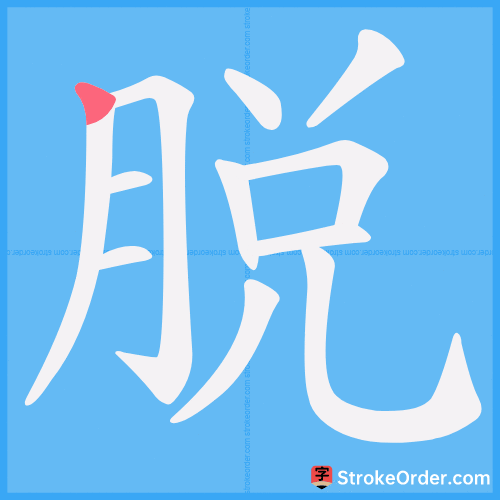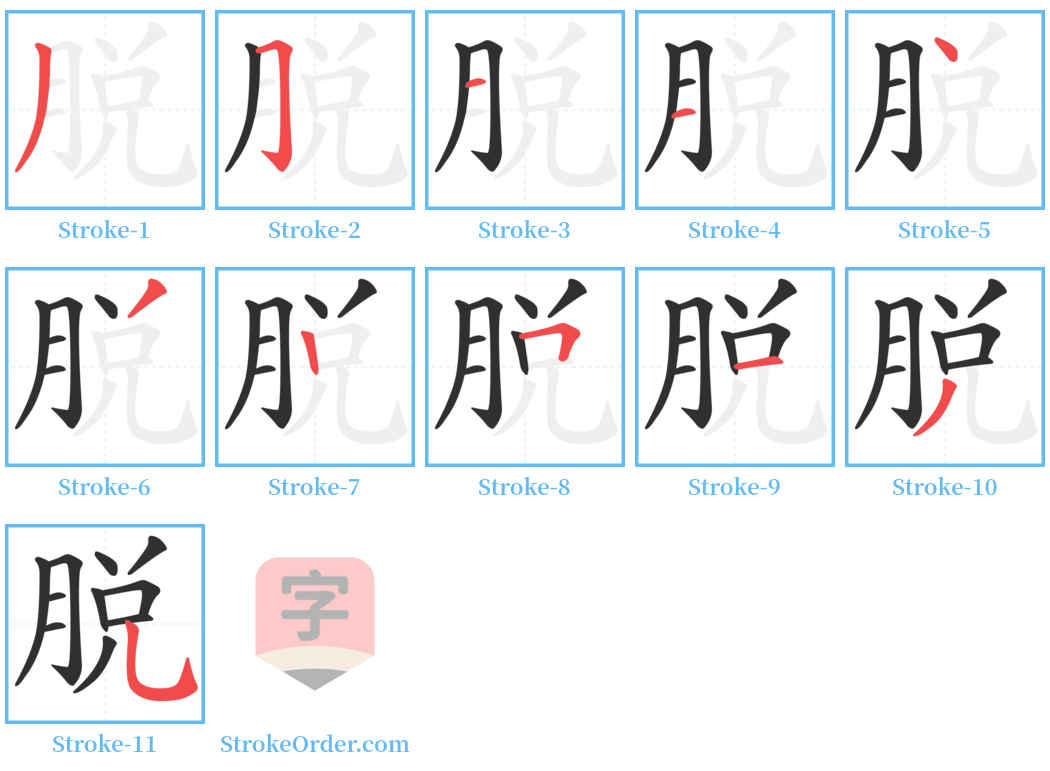脱 Stroke Order
Animated Stroke Order of 脱

Stroke Order Diagrams for 脱

Step-by-Step Handwriting Guide for 脱

Learn to Write Chinese Characters with Video Tutorials
Watch the video of writing the Chinese character "脱", learn the correct stroke order (笔顺) of the character "脱", and master the standard way of writing the character "脱".
Free Printable Handwriting Practice with Stroke Order: 脱
Printable Writing Practice Worksheet of "脱" in Portrait Orientation (Tian Zi Ge)

Printable Writing Practice Worksheet of "脱" in Landscape Orientation (Tian Zi Ge)

Information of 脱
Pinyin
tuō、 tuì
Radical
月
Strokes
11 strokes
Usage
★★★★★
Definition
to shed / to take off / to escape / to get away from
脱 (tuō)
1. 离开,落掉。 (Leave, fall off.)
- 例如:脱产。(e.g., to disengage from production.)
- 脱发。(e.g., to lose hair.)
- 脱节。(e.g., to deviate.)
- 脱离。(e.g., to separate.)
- 脱落。(e.g., to drop off.)
- 脱贫。(e.g., to get rid of poverty.)
- 脱稿。(e.g., to complete a written work.)
- 脱手。(e.g., to let go.)
- 摆脱。(e.g., to shake off.)
- 挣脱。(e.g., to struggle free.)
- 临阵逃脱。(e.g., to escape when the situation is critical.)
2. 遗漏。 (Omission.)
- 脱漏。(e.g., omission.)
- 脱误。(e.g., to make an error due to omissions.)
- 脱文。(e.g., characters omitted during copying, also known as "夺文".)
3. 取下,除去。 (Take off, remove.)
- 脱下。(e.g., to take off.)
- 脱帽。(e.g., to remove one's hat.)
- 脱氧。(e.g., to remove oxygen.)
- 脱脂。(e.g., to remove fat.)
- 脱胎换骨。(e.g., to completely transform.)
4. 倘若,或许。 (If, perhaps.)
- 脱有不测。(e.g., if there are unforeseen events.)
5. 轻慢。 (Lack of seriousness.)
- 脱略。(e.g., relaxed, unrestrained.)
- 脱易。(e.g., careless, impolite.)
- 轻脱。(e.g., frivolous, not serious.)
6. 姓。 (A surname.)
Additionally, the word can refer to various other meanings and contexts depending on usage:
- 作为动词 (As a verb):
1. 同本义 (Peel off).
2. 离;脱离 (Separate oneself from).
3. 脱落;掉落 (Shed).
4. 脱下,取下 (Take off).
5. 逃 (Escape from).
6. 失去;散落,缺漏 (Fall in a scattering way; omit; lose).
7. 把东西变卖出去或把货物推销出去 (Dispose of).
8. 照着描画;临摹 (Copy).
9. 过去 (Pass).
10. 欺骗 (Deceive).
11. 冒出,说出 (Bubble out, say out).
- 作为名词 (As a noun):
1. 指病情突变、阴阳相离而致生命垂危的病理及其症候 (Prostration syndrome).
2. 又指中风脱证 (Also refers to apoplexy syndrome).
- 作为副词 (As an adverb):
1. 表示频度,相当于“偶尔” (Once in a while).
2. 表示推断,相当于“或者” (Perhaps).
- 作为连词 (As a conjunction):
1. 表示假设,相当于“倘若” (If).
- 作为形容词 (As an adjective):
1. 洒脱;放任 (Free and easy).
2. 疏忽,轻漫 (Negligent, casual).
Lastly, it can denote a slow, light manner in certain contexts as well.
to break away from / to cast off (old ideas etc) / to get rid of / to break away (from) / to break out (of) / to free oneself from / to extricate oneself
to separate oneself from / to break away from / diastasis (medicine) / abscission / abjunction (botany)
to be born / (fig.) to develop out of sth else (of ideas, stories, political systems etc) / (fig.) to shed one's body (to be reborn) / bodiless (e.g. lacquerware)
to shed one's mortal body and exchange one's bones (idiom); born again Daoist / to turn over a new leaf / fig. to change wholly / to create from other material (story, artwork etc)
to untie / to free / to absolve of / to get free of / to extirpate oneself / (Buddhism) to free oneself of worldly worries
Input Method for 脱
Pinyin
tuo1
Wubi
eukq
Cangjie
bcru
Zhengma
qujr
Four Corner
78212
Unicode
U+8131
Same Pronunciation Characters